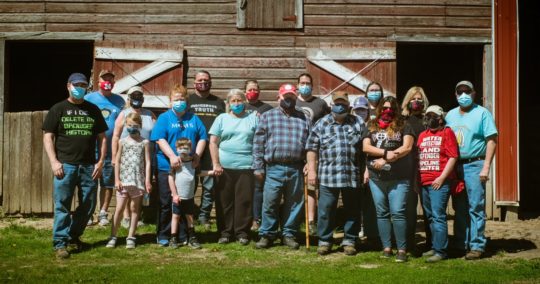Each week, Bold and allied groups recap news and actions related to the proposed TransCanada Keystone XL tarsands pipeline. A new report is more cause for concern regarding inland oil spills, the President speaks out on the pipeline and Republicans continue to slow negotiations on the transportation bill with their misguided insistence that fast-tracking TransCanada’s tarsands pipeline be included…those stories and more below!
Weekly Action Ideas:
Contact the White House: We need to thank President Obama for reinforcing the basic facts–TransCanada’s project is an export pipeline and will do nothing to decrease gas prices. All TransCanada leaves us with is the risks to our land and water. Remind the President that Nebraska wants him to deny the pipeline permit (including Gov. Heineman, remember!)
Be a NEAT Neighbor: TransCanada’s land agents and the DEQ are out if full force to try and get landowners to “open the door” and let them on the land for “surveys.” This is a tactic used to get info they already have. You see, they just want to build a relationship so they can start to get info from you to use during negotiations. Read more about what you can do to protect your rights. We need more folks to sign-up to be a NEAT neighbor.
News + Developments:
In an AARP interview, President Obama states that Keystone XL is an export pipeline that will not reduce U.S. gas prices and acknowledges that the best way to keep gas prices low is to reduce demand. From the President: “they want to build a pipeline to pump from Canada to the Gulf of Mexico, where they can then export that oil all around the world. It’s not going to make a dent in gas prices here in the United States.”
The annual debate at Boys State and Girls State focused on the pipeline. I pushed back on every point Brad with AFP brought to the debate and made sure young leaders in the audience knew their voice matters in protecting our property rights, land and water.
This month’s Risk Analysis magazine found that there is a significant risk of oil spills at inland locations that threaten lakes, streams, and rivers. This study is particularly relevant as Nebraska determines the environmental impact of the Keystone XL tar sands pipeline. Currently, the Nebraska Department of Environmental Quality has no particular process or checklist for determining whether or not a pipeline is environmentally sound. USA Today reported on the findings saying, “Despite the attention paid to the 2010 Gulf of Mexico oil spill disaster, which released about 4.9 million barrels of oil into the Gulf of Mexico, the majority of oil spills, about 60%, are inland ones…The data in the study showed that inland crude oil spills occurred way more often near small towns of fewer than 10,000 people, accounting for 77% of the spills, which might raise concerns about response times to accidents. The study evaluated several dozen ‘high-risk’ watershed locations, rating them as two to five times as vulnerable to spills than the great mass of other watershed locations. ‘Mostly it is where there are pipelines,’ Brody says, not a big surprise.”
Senate conferees attempted to move forward negotiations on the transportation bill putting together a proposal for their House colleagues. However, The Hill reports House Republicans “gave it an initially cool reception” because Senators Boxer and Inhofe, the bipartisan duo who pitched the plan, did not include a provision for the Keystone XL tar sands pipeline. While Republicans appear prepared to risk the passage of a necessary bill with their pet project, as the White House is threatening a veto of the bill if it includes the pipeline add-on. Politico’s Morning Transportation this week quoted White House spokesperson Matt Lehrich who said “the GOP needs to ‘put jobs and safety ahead of partisan politics.’” Anthony Swift of the NRDC agrees. Swift summed up why “Keystone has no place in the transportation bill” in an op-ed piece in the Hill.
Tarsands Graphic Video: Remember that great video by Willie Nelson and Chipolte about local food, well the Sierra Club released a graphic video this week, narrated by actor Joshua Jackson, called “The Dirtiest Oil on Earth” which illustrates the dangers of spills, destruction of natural areas, contamination of air and water supplies and political influence exerted by the oil industry to build pipeline projects designed to transport tar sands across the US to reach foreign markets. Post it on FB and Tweet away with the link.
Netroots Nation: With a great title “The Last Stand Against the XL Pipeline,” Esquire writer Charles Pierce stopped by the pipeline panel to get the updates on Nebraska and our collective fight. Thanks to Bill McKibben, Becky Bond, Kim Huynh, Brad Johnson and Ben Powless for a powerful panel. You can watch the video of the panel archived online.
EPA + TransCanada: It seems TransCanada is doing everything they can to avoid the EPA’s valid questions about water crossings for their Cushing/Texas Extension pipeline. An EPA letter that was once a mere blip on the radar for the Keystone XL oil pipeline may now be the last federal regulatory obstacle facing the controversial project. Landowner David Daniel is quoted, “We’re fed up with the tactics. We demand transparency. We demand EPA involvement. And we demand that our concerns be openly and publicly addressed.”



